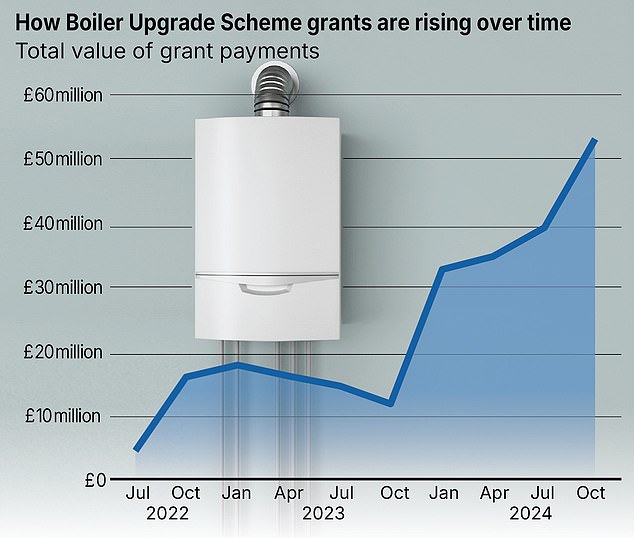- The boiler improvement plan just had the most successful quarter in its history
Figures reveal a record number of households are receiving government grants for heat pumps worth up to £7,500.
The Boiler Improvement Scheme (BUS) provides grants to install a heat pump in properties to encourage the uptake of ‘greener’ heating technologies.
The latest figures show that a record 7,090 households received a BUS grant in the period August to October 2024.
This represents an increase of 35 percent compared to the previous three months and an increase of 204 percent year-on-year.
Grants totaling £53.1 million were awarded between August and October 2024, around a fifth of all BUS grants paid since the scheme was launched in May 2022.
An Ofgem spokesperson said the rise in heat pump grants was partly due to the maximum grant being increased from £5,000 in 2023, as well as the previous government reducing bureaucracy around minimum insulation requirements. in May 2024.
Pump action: Brits are gearing up for heat pumps, and installation grants are proving popular
Heat pump installation costs vary greatly, depending on your home, the heat pump you choose, and whether any improvement work is required on your property.
The £7,500 BUS grant is unlikely to fund the full cost of purchasing a heat pump. British Gas, a major heat pump installer, said its starting price was £7,999 for an air source heat pump, but most customers paid £13,190.
However, demand for heat pumps still lags behind overall BUS funding.
The BUS paid £88.8 million in 2023/24, against a budget of £150 million, while in 2022/23 the BUS paid £51 million.
The Government has set aside £180 million for the BUS for the current 2024/25 year, of which £30 million was added last month.
The most common type of BUS-funded heat pump is air source, Ofgem figures show.
Applications for air source heat pumps to date total 36,165, or 96.7 percent of all BUS grants.
Geothermal heat pumps got 2.6 percent of BUS funding, biomass boilers 0.7 percent and shared ground loop heat pumps 0.06 percent.
The Southeast was the region that received the most BUS grants, followed by the Southwest and the East.
Half of BUS subsidies are used to replace gas boilers and 19 percent to improve oil heating systems.
More than a sixth of BUS grants (16.2 percent) were used to install heat pumps in a home that had no previous heating system, while 9.2 percent replaced electric heaters.
| Category | Region | Total grants | Total % |
|---|---|---|---|
| 1. | southeast | 7,433 | 19.9 |
| 2. | southwest | 6,863 | 18.3 |
| 3. | This | 5,062 | 13.5 |
| 4. | East Midlands | 3,740 | 10 |
| 5. | Yorkshire and Humber | 3,598 | 9.6 |
| 6. | Northwest | 2,940 | 7.9 |
| 7. | West Midlands | 2,857 | 7.6 |
| 8. | London | 1950 | 5.2 |
| 9. | Welsh | 1930 | 5.2 |
| 10. | Northeast | 1,044 | 2.8 |
| Source: Ofgem | |||
The Labor Party will further promote the adoption of heat pumps as part of its Warm Homes Plan.
This is a Government manifesto initiative to upgrade the properties of low-income homeowners and private tenants into homes with EPC grades from D to G to at least C.
Each eligible household can use the scheme to access £15,000 towards energy efficiency improvements and an additional £15,000 to install low carbon heating such as heat pumps.
Homeowners and tenants will not have to pay any of their own cash to improve their homes in this way.
However, homeowners will receive payment for improvements to one home under the scheme and will then contribute to paying 50 per cent of the cost of improving each additional home.
Chancellor Rachel Reeves said in her Autumn Budget that £3.4 billion would be spent on the Warm Homes Plan from 2025 to 2028. The plan aims to upgrade five million homes.


